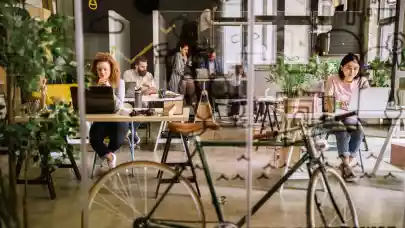
A dramatic shift in the terms, functionality and layout of office rental space is predicted as a direct result of the global pandemic. Organisations could begin to develop innovative strategies that prevent and tackle environmental disasters which encompass disaster recovery plans and hygiene enablers. FreeOfficeFinder.com, an online agent marketing over 2500 UK serviced office providers, has spoken with tenants and landlords to gather perspectives and predictions of how the pandemic will drive changes and considerations for selecting office space.
- Virtual office tours Enforced social distancing measures has left prospective tenants unable to attend physical viewings. Viewing a property is an essential stage of securing a new space and many office providers have turned to virtual technologies to aid this process. 360- degree viewing technology guides the tenant throughout the entirety of the space; immersing them at their own convenience. However, envisioning how and if the space is suitable for their needs can be challenging virtually. To overcome this issue, in the future, a combination of both virtual and physical viewings could take place.
- Co-working (hot-desks to fixed desks) Countless organisations encourage their employees to ‘hot-desk’ to support collaboration across teams and departments. Social distancing measures could see the extinction of such practices. To reduce the likelihood of cross-contamination, workers could find themselves perched at the same desk, day in, day out. Desks in currently shared office spaces may be replaced by their larger counterparts to ensure that workers are provided with adequate distance from colleagues.
- Higher percentage of remote workers A topic currently receiving much speculation and chatter is the increase in remote working practices. Across the globe, companies are tackling the challenge of running their operations remotely. Many benefits of remote working have been published including higher levels of productivity and transparency. If these benefits are realised by organisations that may opt to remain semi/fully remote. However, office space is much more than just a place of work. Companies acknowledge the importance of shared spaces for social and cultural benefits. Therefore, we predict that smaller office spaces with fewer desks may become increasingly popular as the COVID-19 pandemic pans out.
- Flexible space The aftermath of COVID-19 Is unpredictable, and it is unknown how it will impact the growth of organisations and their teams. Tenants will seek terms in which they can upscale or downsize their office spaces to accommodate for fluctuations in demand and recruitment. An increase in shared spaces offering comprehensive packages; including utilities is also predicted.
- Pre-agreed rent reductions for lockdown The future of remote working remains unclear as there is speculation surrounding the second wave of infection to hit later this year. Tenants will be searching for relationships and contracts that consider the prospective impact of pandemics and alternative environmental challenges. Terms could include pre-agreed fee reduction in the event of another lockdown or social distancing measures. We predict that these terms and agreements will span between all parties of the rental hierarchy; from head landlords to tenants.
The full article with 9 key predictions based on recent conversations with tenants and landlords is available here.



